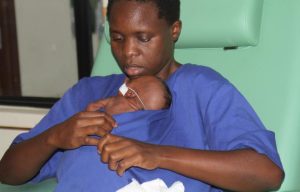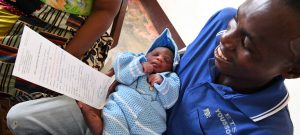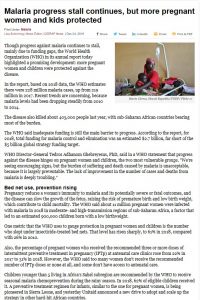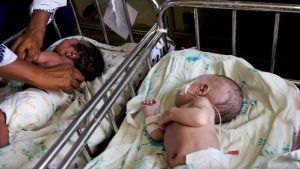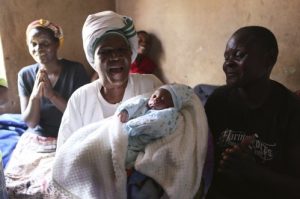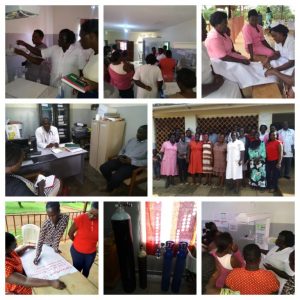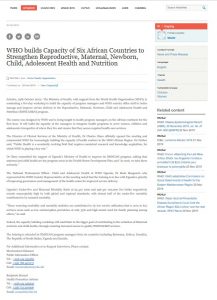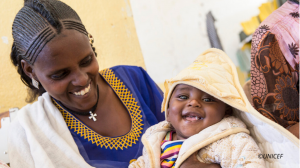Kangaroo mother care technology at Mother Baby Unit at PGH boost growth of preterm babies
This article was originally published by the Standard Digital When Susan Akinyi, 26, from Heshima estate in Nakuru gave birth to her second child, she was worried and confused. The baby was too tiny, with low birth weight of only 900 grammes. It was hard for the mother to cuddle her baby, but a nurse … Continued
Failure to register newborns leaves millions ‘invisible’ warns UN Children’s Fund
This article was originally posted on UN News UNICEF reports that the births of one in four children under-five, or some 166 million children globally, have never been officially recorded. Too many children are “slipping through the cracks,” said Henrietta Fore, the agency’s Executive Director: “A child not registered at birth is invisible – nonexistent … Continued
Mothers and newborns pay the ‘price’ during Zimbabwe medics strike
This article was originally published by The World In September, over 500 doctors under the banner of the Zimbabwe Hospital Doctors Association (ZHDA) went on strike over poor working conditions and inadequate salaries, but it wasn’t until last month that nurses in Harare joined them — further crippling Zimbabwe’s already deteriorating health sector. As a … Continued
Malaria progress stall continues, but more pregnant women and kids protected
This article was originally published by CIDRAP Though progress against malaria continues to stall, mainly due to funding gaps, the World Health Organization (WHO) in its annual report today highlighted a promising development: more pregnant women and children were protected against the disease. In the report, based on 2018 data, the WHO estimates there were … Continued
Could adding folic acid to salt curb Ethiopia’s sky-high rate of spinal cord deformities?
This article was originally posted on ScienceMag By Meredith Wadman Tony Magana, chief of neurosurgery at Mekelle University School of Medicine in Ethiopia’s Tigray province, confronts his country’s high prevalence of neural tube defects nearly every day. His team operates on more than 400 babies annually to repair these severe, often lethal birth malformations, in … Continued
Antenatal care in Kenya needs improvement
This article was originally published on The Conversation Maternal and neonatal mortality has remained high in low-resource settings despite progress in recent years. The estimated maternal mortality ratio in Kenya is 342 per 100,000 live births, a startling 18 times the rate in the United States. High quality prenatal care can address these high levels … Continued
No training, no gloves: Zimbabwe’s desperate childbirths
This article was originally published by AP By Farao Mutsaka When her contractions became unbearably painful, 18-year-old Perseverance Kanyoza rushed to a maternity hospital in Zimbabwe’s capital, Harare. But the doors were closed amid a weekslong strike by public health workers. With no money for private care, panic set in. A hospital guard directed her … Continued
Newborn care units at Health Centre IV: the MANeSCALE experience
From explaining how to mix drugs in the right doses for premature babies to explaining how a radiant warmer works, Nursing Officer Sarah Mirembe clearly knows what she is doing given the confidence she exudes. It is apparent from her talk that she has no problem with dump dusting and mopping her workstation in order … Continued
Building Capacity of Six African Countries to Strengthen Reproductive, Maternal, Newborn, Child, Adolescent Health and Nutrition
This story was originally published by the World Health Organization Entebbe, 29th October 2019 – The Ministry of Health, with support from the World Health Organization (WHO), conducted a five-day workshop to build the capacity of program managers and WHO country office staff to better manage and improve service delivery in the Reproductive, Maternal, Newborn, … Continued
Maternal, newborn health improves in rural Ethiopia but inequities still exist
This story was originally published by the Addis Standard. Community-based health programs in parts of rural Ethiopia, Nigeria, and India were successful in improving health care for mothers and newborns, but inequities still exist, according to a new study in CMAJ (Canadian Medical Association Journal). “Our findings have both an optimistic and a pessimistic interpretation, … Continued
